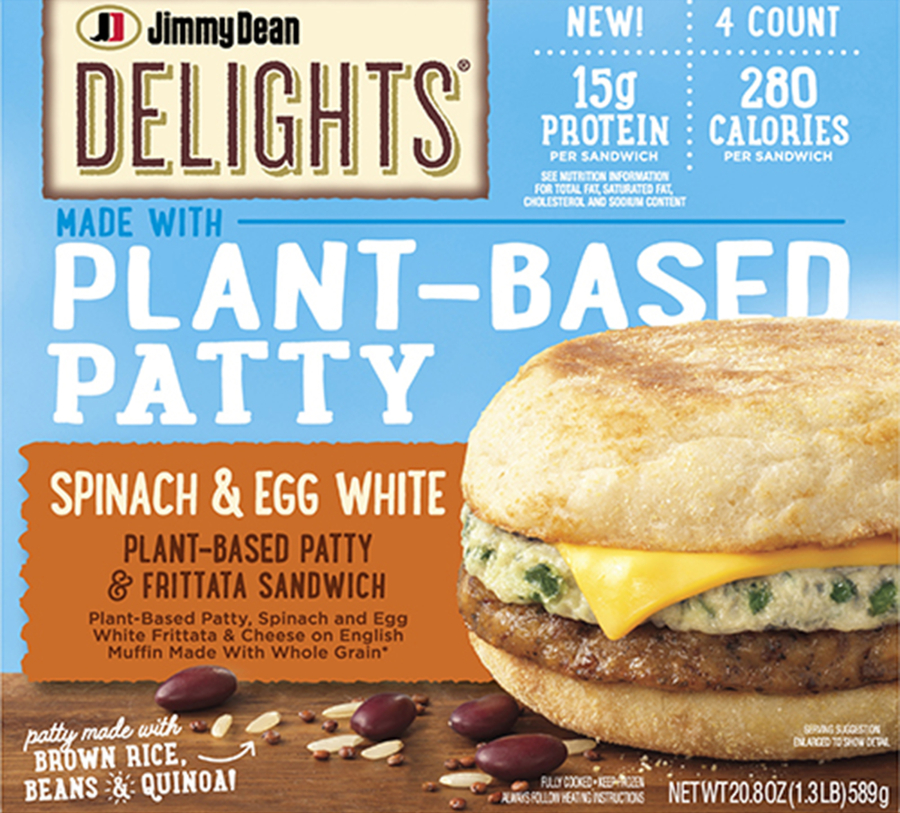Jimmy Dean, the quintessential breakfast sausage brand, is adding plant-based patties in a product debut that is as sure a sign as any that America is in the midst of meat-free revolution.
Jimmy Dean, owned by Tyson Foods, on Wednesday announced the launch of two breakfast items featuring plant-based patties, the first alternative protein products under the 52-year-old Jimmy Dean brand.
The egg and cheese croissant sandwich, available at Sam’s Club stores nationwide, uses a patty made with soy protein and egg white, while the spinach frittata sandwich, which will launch in the spring, uses a patty made of soy protein, black beans, brown rice, quinoa and egg white. The patties use the signature sausage seasoning to taste like the original, the company said.
Meat industry stalwarts have been investing in plant-based protein alternatives as sales of fake meat continue to surge and innovations using different ingredients and technologies make it taste more like the real thing.
Sales of plant-based meat alternatives grew to $940 million in 2019, up 38% from two years earlier and a major part of the $5 billion plant-based foods market, according to the Good Food Institute, citing data from market research firm Spins.
According to Tyson, by the end of 2020 a majority of Americans claimed a “flexitarian” diet in which they were trying to incorporate more plant-based foods along with their meat staples.
“Plant-based foods are revolutionizing the way people eat across meal occasions, including breakfast,” Scott Glenn, senior director of marketing for Jimmy Dean, said in a news release. “As the protein breakfast leader, expanding our portfolio to provide people with alternative choices was critical.”
Springfield, Arkansas-based Tyson, which has a large corporate office in Chicago and is one of the world’s largest meatpackers, made a big push into the plant-based sector in 2019 with the launch of Raised and Rooted, a line of plant-based faux-chicken nuggets and burgers. It previously held a minority stake in Beyond Meat but sold it just before that company went public.
Smithfield Foods, Perdue, Hormel Foods and Nestle also have filled grocery store shelves with plant-based meatballs, sausages, nuggets, burger and ground beef alternatives.
This year is poised to be another big year for the category, which has grown in popularity for health, animal welfare and environmental reasons.
Impossible Foods on Wednesday announced a 15% price cut on its restaurant-bound products, including plant-based burgers and sausages, the second reduction in a year, and said more are to come. Impossible Foods, which has raised $1.3 billion and increased production sixfold since 2019, has said its goal is to create a more environmentally sustainable food system, as plant-based meat alternatives use far less water and land, and produce less greenhouse gas emissions than animal farming.
McDonald’s, the world’s largest burger chain, has said it expects to test its new McPlant sandwich in some markets this year. The McPlant sandwich is a long-awaited answer to Burger King’s Impossible Whopper and Carl’s Jr.’s Beyond Famous Star Burger.
Meanwhile, lab-grown meat — which is not plant-based but rather derived from animal cells — has taken a step closer to consumers’ dinner plates. Singapore in December gave regulatory approval for U.S. startup Just Eat to sell its “cultured chicken” as an ingredient in nuggets, a pioneering step that is prompting speculation about which countries may follow suit.



